If Type 2 Diabetes has left your blood sugar to spike and dip uncontrollably, it’s time to get off that roller coaster. These swings in your glucose levels can make you feel very sick and downright crummy. Making lifestyle switches and proper diet decisions will help improve your blood-sugar control right away.
What type 2 diabetes does to your body is it decreases the insulin production of your body. Insulin regulates your blood sugar, and without it, your glucose levels will build up in the blood and will cause damage to your nerves and blood vessels. The increase of sugar in your blood can also potentially put you at risk of stroke and other heart diseases. Overtime, if your blood sugar is not controlled, this can lead to other health issues like kidney failure or even blindness.
According to Dr. Melissa Li-Ng, an endocrinologist at Ohio Cleveland Clinic, fatigue, blurry vision, increased thirst, and frequent urination are among the symptoms of high glucose levels. In order to prevent long-term health consequences, you must take action on your health as soon as these symptoms are already evident.
Dr. Li-Ng also encourages you to take proactive measures because your body can get used to chronic high blood sugar levels and yet feel completely fine even if your body is already experiencing damages. It’s also important to closely monitor sugar levels in case it drops too low. The symptoms of low sugar levels are lack of coordination, sweating, weakness, dizziness and irritability.
There are certain strategies you can do to prevent blood sugar spikes, says Academy of Nutrition and Dietetics spokesperson Toby Smithson, RD, LDN, CDE. Rather than focusing on what you can’t have, try including these healthy habits in your daily diet:
Eat More Nuts
Almonds, pistachios, and walnuts contain healthy fats that can slow down the absorption of sugar in your body. But you also have to make sure that you don’t finish an entire bag in one sitting. As healthy as they are, they still contain calories. Eating a handful of these nuts once or twice a day will do.
Eat More Grains
Eating more fiber-rich foods containing beta-glucan will help prevent sugar spikes. These include barley, rye and oat bran. What it does is it slows down “stomach-emptying” and allows your body to take its time absorbing nutrients – including sugar. But make sure to limit grains as these are still carbohydrates. They can still raise your blood sugar, they just take some gradual time unlike eating processed foods does.
Eat More Vegetables
Vegetables are low in carbohydrates and rich in fiber. Replacing carbohydrates with low-carb vegetables can help you stay fuller for longer periods of time without fueling your body more sugar it doesn’t need. It also prevents blood sugar surges while providing you with essential nutrients your body needs.
Spice Your Food Using Turmeric and Cinnamon
Turmeric has a reputation of having strong anti-inflammatory properties. Recent turmeric health benefits research tells us that taking it’s potent biochemical compound curcumin reduces the activity of cytokines IL-6, IL-1, and TNF – the inflammatory enzymes that tend to be overactive among diabetics. Including curcumin extracts as a part of the daily diet can improve the action of the disrupted insulin-response pathways among type 2 diabetes patients.
Cinnamon is also a good spice to include in your diet. A study published in Annals of Family Medicine 2013 showed that cinnamon can help decrease fasting blood sugar levels. Including this spice in your diet can help stimulate the pancreas to secrete more insulin.
Be Handy With Vinegar
According to the 2012 study of The Journal of Community Hospital Internal Medicine Perspectives, vinegar helps slow down sugar absorption in the body. Their research revealed that fasting blood sugar levels were lowered after their subjects took 2 ounces of apple cider vinegar. As it helped increase insulin sensitivity, it is recommended to take at least 1 tablespoon of apple cider vinegar 30 minutes before meals.
Never Skip Meals
According to Dr. Li-Ng, eating meals less than 3x a day can cause greater fluctuation in your blood sugar. Make sure to at least eat 3 healthy meals a day and low-calorie snacks in between. Never skip meals as they can cause eating splurges. This kind of meal plan will help stabilize your blood sugar the entire day.
These lifestyle changes are crucial in preventing diabetes. Because high blood sugar levels can pose a threat to your health, it’s important to take action on your health immediately.
You find this article by searches related to following terms:
- does protein prevent blood sugar spikes
- how to prevent blood sugar spikes at night
- cinnamon prevents blood sugar spikes
- how can i prevent blood sugar spikes
- how do you prevent blood sugar spikes
- prevent morning blood sugar spikes
- foods that prevent blood sugar spikes
- Prevent Blood Sugar Spikes
- how to prevent blood sugar spikes after exercise
- diet to prevent blood sugar spikes
